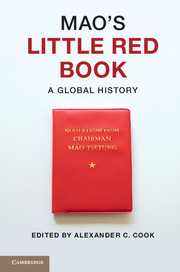Book contents
- Frontmatter
- Contents
- List of illustrations
- List of contributors
- Preface
- 1 Introduction
- 2 A single spark
- 3 Quotation songs
- 4 Mao quotations in factional battles and their afterlives
- 5 Translation and internationalism
- 6 Maoism in Tanzania
- 7 Empty symbol
- 8 The influence of Maoism in Peru
- 9 The book that bombed
- 10 Mao and the Albanians
- 11 Partisan legacies and anti-imperialist ambitions
- 12 Badge books and brand books
- 13 Principally contradiction
- 14 By the book
- 15 Conclusion
- Index
- References
3 - Quotation songs
Portable media and the Maoist pop song
Published online by Cambridge University Press: 05 June 2014
- Frontmatter
- Contents
- List of illustrations
- List of contributors
- Preface
- 1 Introduction
- 2 A single spark
- 3 Quotation songs
- 4 Mao quotations in factional battles and their afterlives
- 5 Translation and internationalism
- 6 Maoism in Tanzania
- 7 Empty symbol
- 8 The influence of Maoism in Peru
- 9 The book that bombed
- 10 Mao and the Albanians
- 11 Partisan legacies and anti-imperialist ambitions
- 12 Badge books and brand books
- 13 Principally contradiction
- 14 By the book
- 15 Conclusion
- Index
- References
Summary
Singing Chairman Mao’s quotation songs, we think of Chairman Mao; singing Chairman Mao’s quotation songs, we remember Chairman Mao’s instructions; singing Chairman Mao’s quotation songs, it’s as if Chairman Mao himself is by our side.
People’s Daily, September 30, 1967At the Ninth National Congress of the Communist Party of China in April 1969, Chairman Mao’s wife Jiang Qing issued a surprising broadside against a form of music that had once seemed to embody the political passions of the Great Proletarian Cultural Revolution: the quotation song. These songs, which had been promoted nationwide since September 1966, set the Chairman’s maxims to music, and were deliberately conceived as a musical analogue and mnemonic device for Quotations from Chairman Mao, more popularly known as the Little Red Book. Upon watching a televised song-and-dance program extolling the Chairman, Jiang Qing is reported to have said:
Don’t you believe that they are singing about Mao Zedong thought – that’s not really what it is at all. It’s yellow music. We’ve already dealt a blow to the emperors and feudal lords, and now they’re doing this sort of thing? In future, we need to get rid of folk tunes, we need to be rid of this swing music. They say they’re eliminating the old and ringing in the new. What’s new here? Some of their movements are based entirely on swing dancing.
She continued, “They’re wearing red stars and waving red flags, but they’re swing dancing. They may as well be naked.”
- Type
- Chapter
- Information
- Mao's Little Red BookA Global History, pp. 43 - 60Publisher: Cambridge University PressPrint publication year: 2014
References
- 23
- Cited by

